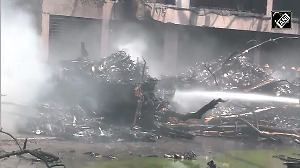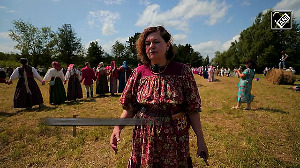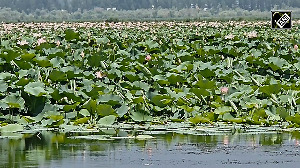A year has passed since that fateful day when the Sabamati Express was set afire in Godhra, sparking one of the worst communal carnages in independent India. Yet, February 27 remains a date with incredible hurt and pain for the kin of those who were burnt alive inside the Sabarmati Express near Godhra railway station.
Dr Girishchandra Raval, 85, recounts:
It was 11.30pm on February 27, 2002, and I stood at the Maninagar railway station along with my son waiting for my wife Sudhaben to arrive on the Sabarmati Express.
Only a day earlier, I had spoken to my wife who had called me up to say that she was on her way back. She was happy and contended after her visit to Ayodhya.
The wait grew longer and I started getting worried. Repeated inquiries with the railway authorities yielded little and deepened the mystery about the train's inordinate delay.
The railway authorities would only say: "The train is parked just outside Godhra railway station. Contact the Godhra railway staff..." But the telephone lines were busy and it was very difficult to get across to Godhra.
By then word of mouth had prepared me for the worst. Finally, I did get to talk to an official at the Godhra railway station and they told me about the barbarous attack and that many had been burnt to death.
Finally the relief train arrived with the survivors of Godhra and young lads with saffron bandanas poured out shouting Jai Shree Ram. Even in all the chanting the mood was sombre. One by one the names of the survivors from the S6 compartment were called out.
Sudhaben was not among those who walked out to be enfolded in the warmth of family members awaiting them. I knew she had to be among those 58 who had been burnt to death.
When I contacted Vishwa Hindu Parishad office-bearers and expressed my wish to reach Godhra, they dissuaded me saying that I should wait instead at the Sola Civil Hospital. That's where the mortal remains were to be brought.
My daughter-in-law Bela and 18-year-old granddaughter Khusbu were beside themselves with grief, but I knew that no amount of tears would bring back my dear one.
At the hospital time seemed to have stopped and each minute seemed like an eternity. Blocks of ice were brought in, deepening the feeling of bereavement that I felt along with scores of others who had collected at the gloomy premises.
The night wore on and it was only around 4am on February 28 that trucks carrying the bodies from Godhra arrived under police protection. Amidst the chants of Ramsevaks I was told that this bundle of white clothes was my Sudha.
I believed them. I had no choice, neither did I have any strength to argue. With a heavy heart we proceeded home. From then on till the final rites it all seems hazy and like a bad dream.
If Godhra was the handiwork of anti-nationals, then the mindless violence and killings that followed were reprehensible. I just cannot figure out why people fall for these so-called Hindutva activists who are in fact politicians in disguise, furthering their own cause.
Life for me has never been the same. At a time when one enjoys retired life, I have had to renew the struggle for existence. The year 2002 has been like a nightmare for us.
On April 4, 2002, I wrote a letter to Gujarat's director general of police saying that the Juntanagar society in Ramol area [of Ahmedabad] was showing dangerous signs of communal tension. I requested a police picket at this point.
But despite the fact that no less than 11 persons from Juntanagar were killed in the Godhra attack, nothing was done. And on April 16 my worst fears came true. My son Ashwin (40) had gone to the walled city for some business with a friend, Pratap Barot. Around 3.30pm, when they were headed back near the Surti Society here, they were surrounded by a mob of rioters. Both were brutally stabbed. A day later my son, who was a VHP activist, breathed his last and we were bereaved a second time.
But life has to go on and I continue to live in this minority-dominated locality and fight for survival and justice. I have sent my file of complaints to the VHP where I have written how the DGP neglected my warning, which resulted in the death of my son.
But now nobody bothers whether we live or die. The VHP, which had promised to supply food grains every month, stopped doing so after June. In June they gave me 20 kilos of wheat, 5 kilos of rice, 2 kilos of daal [lentils] and 1 litre of cooking oil. That was it. They forgot us after that.
Of the Rs 3 lakh (Rs 1.5 lakh for each death) that the government granted for the deaths in my family, I have got only Rs 1.2 lakh and another Rs 80,000 as Sardar Sarovar Narmada Nigam bonds that can be encashed only 10 years later. The VHP never kept its promise of giving me Rs 50,000 as aid.
I have a young granddaughter who will soon be ready for marriage and a 40-year-old daughter-in-law to care for. Who do I turn to? All this hullabaloo about the Godhra killings is a farce. Only the kin -- be they Hindu or Muslim -- can understand what it is like dealing with the painful memories, depression, and financial insecurity.
I only wish I could make those religious fanatics [who caused the bloodbath at Godhra and thereafter] understand how it feels to lose dear ones to mindless violence. Only then will they understand why it is so important to co-exist peacefully.






